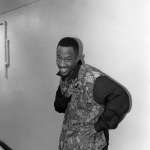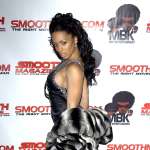Words by Jo Basch
DJ Khalil. One half of the rap group Self-Scientific (for underground hip-hop fans). The man behind beats such as Jay-Z’s “I Made It”, 50 Cent’s “I’ll Still Kill”, Drake’s “Fear” and Eminem’s “Won’t Back Down” (for the commercially inclined). And most notably, a staff producer for Dr. Dre (for those of you paying attention). If the name doesn’t ring a bell right away, it’s probably because he prefers it that way. While the Grammy winner’s resume reads like a who’s who of hip-hop, if he had it his way, he’d pass on the fame altogether and go straight to the music. After all, it’s always been about the music. When a 13-year old Khalil first met his musical hero, Dr. Dre, at a party his parents had thrown (Khalil’s father was former basketball legend Walt Hazzard), he had no idea that his words would actually come to fruition.
“I told him that I wanted to be just like him – I wanted to be a producer,” Khalil says of that chance meeting.
A little over ten years later, after having made a name for himself in underground circles, DJ Khalil’s career came full circle when he joined Dre’s production team. Over the years he continued to perfect his craft while diligently carving and solidifying his place within an, oftentimes, uninspired production world. TheUrbandaily sat down with the ever-humble beatsmith to discuss his musical process, his work with the good Dr., and his contributions to albums by Pink, the budding Kendrick Lamar and Jay Electronica…
TheUrbanDaily: For people who might not be familiar, how would you describe your sound?
Khalil: My sound is like a blend of Dr. Dre and Pete Rock. Those are my two favorite producers. So I would say the west coast, funk-style from Dre but still hard and dark, and the musical part of Pete Rock and the real raw hip-hop side of him. The chopping samples and using drum breaks and all that stuff. So it’s like a combination of the two, with a little bit of the J Dilla swing…
I notice a lot of your beats have this sort of raw, electric guitar sound. How does that figure into the kind of soundscape that you create?
Yeah. Well, I like the human element in what I do. I’ve used the same guitar/bass player for 14 years, Daniel Seeff, and he’s played on pretty much everything I’ve done. And as soon as I started working with him it brought that element. People would chop stuff up and everybody would program but when I first heard Organized Noize and they were using live musicians and they were still doing chopped…I kind of took a piece of that. I always want to incorporate the live musicianship in everything I do because I feel like the human element is missing in music sometimes. Period. To me, great music is made by different musicians coming together and bringing their own talent and perspective…That’s where the magic is.
Dre has a variety of producers that work for him. What would you say you bring to the table, specifically?
In terms of with Dre, I think everybody that has ever worked with him has their own distinct style…Hi-Tek and Denaun and Focus…they do it all. I have a more dark, raw, hip-hop feel…definitely more west coast, just because I’m from LA… All of his other producers – we’re all competitive in a certain way, but the way I look at my relationship with Dre is to inspire him. And if I’m not inspiring him then I’m not doing my job. So that’s really been our relationship. And he’s a big fan of what I’ve been doing and I’ve hopefully inspired him.
Switching gears, Pink’s album “Truth About Love” is out. She collaborated with Eminem for the second time and you produced both tracks. What was that like?
Man…working with Pink changed my life. Just as a producer and creatively, it’s very intimidating, because she’s one of the biggest artists in the world. Then you add Eminem to the mix and you have two of the biggest artists in the world… And they’re kind of similar in the way that they’re both in your face and rebellious and don’t bite their tongues and aren’t afraid to touch any subject, pretty much – it’s phenomenal. And just to see her work…I did a couple of sessions with her, vocally, and she is by far one of the most talented vocalist and artists that I’ve ever worked with. She made things really easy…Pink and I really hit it off, creatively, and she loves the sound. When you work with somebody like that you’re only gonna get better because it really pushes you. It’s a hell of a responsibility to have two artists like that – and you have to make them look great. There’s a lot of pressure that comes with that.
Tell me about how you came to work with Kendrick Lamar.
I met Kendrick when he was writing for Dre. I’d been working on this track and had sent it to Dre and he loved it… So I went over to the studio to meet Kendrick…and I was really new to him – I really didn’t know all of his work. And we went in the studio and we stayed up until seven in the morning working on this record. He’d already cut two verses to it and he came out and we started talking and listening to the track and we started chopping it up and I was like, “I think you can change this part and that part,” and he was like, “really? Ok.” And we went back in and re-cut it and kept going through it and he let me produce it and help craft the whole thing. Which, I didn’t know at the time, was rare because he’s not really like that – he’ll go in and knock it out and just kill it. So the fact that he listened to my direction was impressive. And he killed it! He sent it to Dre, and I’m pretty sure Dre demoed it. And that was kind of the beginning… So around the time that he signed to Aftermath and started working on his album, I went over to the TDE Studio in Carson and took him a bunch of beats and he played me what he had already and I was blown away…
He’s one of the most talked about names in hip-hop right now. What was your impression of him?
I thought he was incredible. The night that we worked, I was like, “yo, this dude is a monster!” When Section 80 dropped, I was one of the many people that bought it and I thought it was definitely a classic. And no one had heard anything like that from the west coast in a while…and he’s super lyrical… Most of the younger artists now are very musical. To me, he’s the pinnacle of that. He just loves real music with great chord changes. He doesn’t want to hear the same pop chords. He wants to hear real music, jazz, and all that kind of stuff. But the way they’re twisting it now is so different.
Jay Electronica has been releasing songs from his long awaited album and you’re on that as well.
Yeah, but who knows if that’s the official track listing. I know I’m on the album, but I haven’t heard the song. Jay Electronica and I – our communication is like every 6-8 months [laughs]. It’s really been like a year since I’ve talked to him. I talk to Young Guru and they keep me posted, because he was overseeing it. Now I think Rick Rubin’s involved. But I know I have a track on there, I just don’t know what the name of it is or what exactly it is.
You’d worked with him before with your group, The New Royales. How was it working with him?
Jay Electronica…his personality is incredible and he’s obviously an amazing artist… I met him through D Prosper, who was managing him and had brought him through. I had [The New Royales] in town and we were working on this song, “Poser”, and he heard it and was like, “Yo! What is this? I wanna jump on it!” And he wrote it right then and we recorded it and we ended up leaking it…or wait – he leaked it actually! Then he came back and we worked. We actually worked on a beat together because he makes beats too, so we would nerd out and I would show him stuff on Reason, which is what I use and he starting using that. Then he would vanish, because everybody wanted him to write for them — Puffy, Dre and all these people, so he would just be gone. We would talk every now and then. Sometimes I’d be on iChat and all of a sudden I’d get this random threat from him, like, “If you don’t send me any beats right now, I’m gonna kidnap…” or whatever [laughing]. We have a great relationship… Anyways, so I sent him a batch of beats and then later on I heard that he recorded to them. And somebody is featured on there, a big artist – I can’t really name that person – but that’s what I heard. I haven’t heard the verse yet… Hopefully we’ll see it come out soon.
With so much competition in the production world, do you ever worry about sustaining this space that you’ve created for yourself, musically?
For a while I was anxious about it because there are so many great producers and young producers coming up and they’re really talented. As you get older you wanna make sure that you’re relevant and all that, but I don’t really worry about it anymore. I was caught up in that but I’m very happy with my perspective, creatively, and what I bring to the table… As soon as you start comparing yourself to other people and the younger kids and trying to be relevant, that’s when you’re dead. That’s when your stuff will never be good enough. That’s probably the biggest lesson I learned in the last year and a half. Everybody has their own perspective and that’s how I’ve been able to get this far. My music is just different. No it doesn’t sound like most of the stuff that’s on the radio or maybe I don’t really make hit records or whatever. But when I look at my body of work and I look at what people have done to my music, it’s really emotional and people like to air out their feelings and they want to be honest on top of my music, and that’s the greatest thing that you can ask for really. That people connect and want to be honest on top of your song. They might want a radio record or a club record or whatever, but if I bring them something, they want to talk about something that really matters to them – whether it’s Jay-Z, Drake, Game or whoever. I really try not to get caught up in the whole, “I gotta have a hit record”. I’m actually happy with that. So if that’s what my calling is, then let me push the boundaries of that. Let me work on that part of it because I feel like I put all my emotion into my music, so that’s important to me.
In a time where everyone is trying to be a “brand” it seems like for the most part you’re not really concerned about getting your name out there like that — to the point where you barely even have a Facebook or Twitter presence.
I think it’s that I’m not really trying to be famous or whatever. I really want my work to speak more so than anything. And I’m a private person, so I don’t feel like I need to be that guy. There are a lot of producers that are under the radar that have had tremendous careers. Like Rick Rubin…it’s just about his musical legacy. Salaam Remi is another person… Being a brand is okay, but being a brand doesn’t mean anything unless you have the music… And yeah, if you make yourself a brand, you might make more money, but I didn’t get into it for that. I didn’t get into it to become a brand necessarily. I got into it because I love making music and I wanted to work with my heroes. That’s what I wanted to do and I’ve accomplished that. And now it’s about becoming better and studying records and trying to make music that I can look back at 20 years from now and be proud of. That’s why I do it. I do want to make some contributions outside of hip-hop, and do my own things in terms of synthesizers and stuff that I’m into. But I get it…everyone is a brand now. A person on Facebook is a brand now. You almost can’t help it, but it’s not my focus. To me, the music is everything.
Like TheUrbanDaily.com on Facebook to stay updated with the latest entertainment news and original interviews!
<p>Facebook Live Is Loading....</p>






